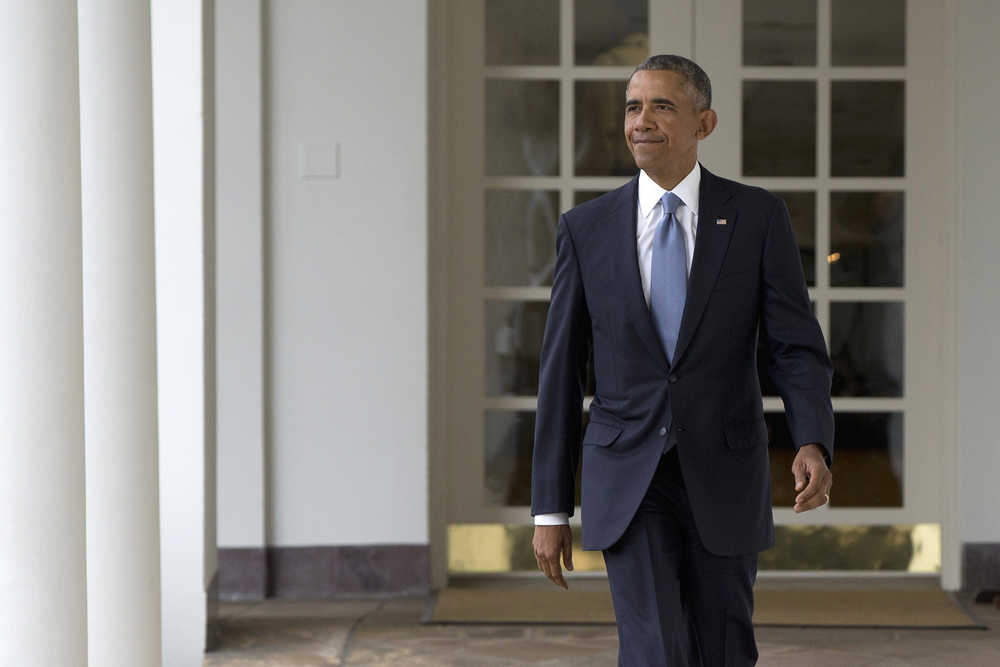WASHINGTON — Lamenting the nation’s persistently deep divides, President Barack Obama declared Tuesday night that opportunity and security for American families “will only happen if we fix our politics.”
In his final State of the Union address, Obama said that while better politics doesn’t mean all parties are in agreement, “democracy does require basic bonds of trust between citizens.”
Obama’s election-year call for political civility amounts to an admission that he’s failed to make good on the lofty promises to bring Democrats and Republican together that were at the core of his political rise nearly eight years ago.
The president’s address to Congress and a prime-time television audience came three weeks before Americans begin voting in the race to succeed him. Seeking to put his imprint on the race, Obama cast an optimistic vision for the future that builds on his eight years in office, while acknowledging that sweeping change has sparked anxieties for some citizens.
“America has been through big changes before,” Obama said. “We made change work for us, always extending America’s promise outward, to the next frontier, to more and more people. And because we did — because we saw opportunity where others saw only peril — we emerged stronger and better than before.”
Embedded in Obama’s remarks was an implicit call to stay the course with Democrats in the November election. Much of what he has done, both in the U.S. and abroad, could be wiped away by a Republican president, increasing his imperative to keep his party in the White House.
Obama delivered his speech before a Republican-led Congress hostile to his ideas and angry about his executive orders on issues from guns to immigration.
While Obama won’t delve into the specifics of the tumultuous 2016 contest, his aides have made clear that he hopes the upbeat address can serve as a counterpoint to what the White House sees as a doom-and-gloom message from GOP candidates, particularly on security issues.
Some of the candidates vying to succeed Obama were in the House chamber for the president’s remarks, including Republican Sen. Marco Rubio of Florida and Vermont Sen. Bernie Sanders, who is running for the Democratic nomination.
Republicans selected South Carolina Gov. Nikki Haley to give the opposing party’s traditional post-speech response. Haley, the daughter of Indian immigrants, is seen by some Republicans as a potential running mate for the party’s eventual presidential nominee.
Her remarks suggested party leaders are eager to counter antagonistic rhetoric from front-runner Donald Trump and other GOP candidates about immigrants, and in particular, refugees trying to flee war-torn Syria.
“During anxious times, it can be tempting to follow the siren call of the angriest voices,” Haley said. “We must resist that temptation. No one who is willing to work hard, abide by our laws and love our traditions should ever feel unwelcome.”
Obama’s advisers, anxious to stave off lame-duck labeling as long as possible, have brushed off suggestions that his speech amounted to a victory lap or a capstone to his presidency. Instead, they said he emphasized that there’s more to do during his last year, including finalizing a Pacific Rim trade pact, enacting criminal justice reforms, building on detente with Cuba, and implementing the landmark nuclear deal with Iran.
Obama did not address the 10 U.S. Navy sailors who were being held by Iran Tuesday night. The Pentagon said the sailors had drifted into Iranian waters after encountering mechanical problems. American officials said Tehran had given assurances the sailors would be returned safely and promptly.
In Washington, election-year politics have curtailed Obama’s already limited ability to work with the Republican-led Congress. As a result, there were few, if any, new policy proposals in his remarks.
Obama reiterated steps his administration is taking to curb the Islamic State group’s power in the Middle East and limit its ability to carry out attacks in the West. Attacks last year in Paris and San Bernardino, California, ratcheted up Americans’ fears about the terror group’s reach, and the White House has acknowledged that it did not fully grasp the public’s level of concern quickly enough.
Tuesday’s address could be one of Obama’s last opportunities to claim a large television audience as president. However, the State of the Union has suffered a major drop-off in viewers in recent years. Last year, Obama’s speech reached 31.7 million viewers, according to Nielson, down from 52 million for his first State of the Union and 62 million for George W. Bush in 2003.
In a bid to amplify his message, the White House rolled out an array of social media programming geared not only toward those who won’t watch on TV but also those looking for a “second screen” experience.
The efforts include a new White House account on Snapchat, where Obama’s aides were sharing behind-the-scenes images and videos of preparations through the see-it-before-it-disappears app. Viewers watching the speech through a YouTube livestream were invited to return on Friday when three YouTube celebrities quiz the president live from the East Room.
___
AP writers Josh Lederman and Nancy Benac contributed to this report.
___
Follow Julie Pace at http://twitter.com/jpaceDC

